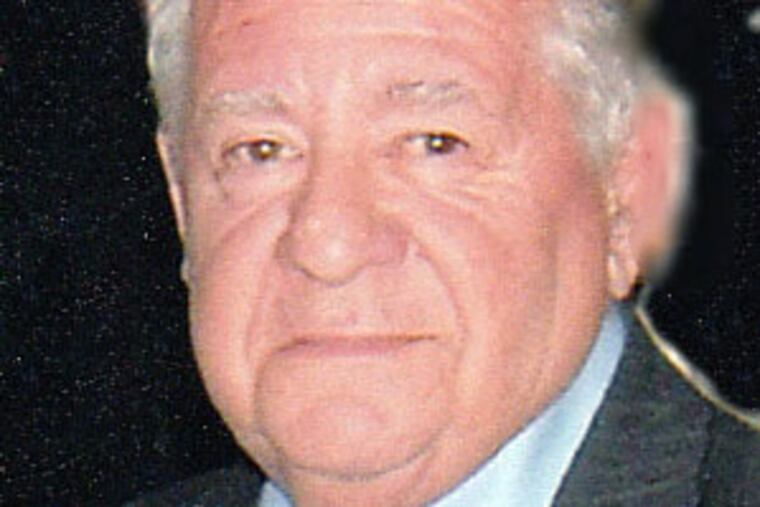
WHEN THE AMERICAN Industrial Arts Association held its convention in Philadelphia in 1967, Mario Todaro, a board member, made 400 ceramic replicas of the key to Independence Hall and passed them out to members.
A Cheyney University administrator who was attending was stunned.
"Who is this guy?" he said. "We've got to have him!"
That's how Mario, then an industrial-technology teacher at Upper Darby High School, became a Cheyney professor. Cheyney made him an offer he couldn't refuse. He joined the faculty in 1968 and taught there until he retired in 1991.
Mario F. Todaro, a man of many interests and talents, a craftsman who could actually build a cannon, an educator and mentor to numerous young people, an Army veteran of the Korean War and loving family man, died Oct. 6 of complications of amyotrophic lateral sclerosis. He was 84 and lived in Springfield, Delaware County.
To say Mario was a collector would be a serious understatement. His home was jammed with jukeboxes, pinball machines, thousands of music records and furniture of his own construction, his walls plastered with old movie posters in various languages, autographed photos of celebrities and military and sports heroes, sheet music and signed baseballs.
"I've given away 2,000 records and I have about 2,000 more to go," said his wife, Dorothy. "He never threw anything away. He was a pack rat."
That Mario could build anything was demonstrated when as an undergraduate at Penn State, he constructed a cannon that was fired every time the football team scored a touchdown from 1952 to 1956.
"He had hands of gold," his wife said.
Mario was a champion gymnast at Penn State, performing on the horizontal bar. He was good enough to be offered tryouts for the Olympics in 1952 and 1956. He didn't qualify for the Olympic teams, but his proficiency earned him a full scholarship at Penn State.
There was some irony in Mario being afflicted with Lou Gehrig's disease, because the Yankees star was one of his favorite athletes.
Mario collected autographs by the simple expedient of writing to his subject and requesting autographed photos. When they arrived, they were affixed to the walls.
He once wrote to another of his heroes, Gen. James Doolittle, famed as the leader of the first bombing raid on Japan on Jan. 2, 1942. He received a nice note in return, and had a large photo of Doolittle on his wall.
Mario was a World War II buff, and was fascinated by ships and aircraft of that era. He took flying lessons at one time, only to discover that he got air sick.
He liked to chill out at his vacation home in Ocean Pines, Md., where he had a pontoon boat, only to discover that he got sea sick.
Nevertheless, he liked crabbing and hosting family get-togethers there, and enjoying, as his wife put it, the "breathtaking sunsets."
Mario was active in the Mario Lanza Institute, and got to know singer Kathryn Grayson, who performed with Lanza in his first film, "That Midnight Kiss," in 1949. They met when she attended one of the celebrations of the late singer at the Mario Lanza Museum, on Montrose Street near 7th in South Philly's Bella Vista section.
"She was a wonderful woman," his wife said of Grayson. "She invited us to her home in Hollywood. We never went."
However, the Todaros traveled extensively, including six trips to Italy.
Mario was born in Philadelphia to Salvatore and Angelina Todaro. He graduated from South Philadelphia High School in 1950. It was there that he started dating his future wife, Dorothy Flacco. They married in 1955.
Also at South Philadelphia High, Mario began his gymnastic training, winning enough honors to ensure his scholarship to Penn State. He was part of the Intercollegiate and National Gymnastic Championship teams for Penn State.
In 1953, Mario enlisted in the Army and served in the Signal Corps in France. He attained the rank of sergeant.
Mario was a member of the Benvenuto Lodge of the Sons and Daughters of Italy, Ocean Pines Boat Club, and was on the board of the Delaware County Chapter of the Pennsylvania Sports Hall of Fame. He was a member of the Knights of Columbus, American Legion and Alpha Phi Delta Fraternity. He was honored by the Chapel of the Four Chaplains.
Services: Were Saturday.
Donations in his memory may be made to the Penn State Men's Gymnastic Boosters Club, P.O. Box 704, State College, Pa., 16804, or the Paralyzed Veterans Association of America, 5000 Wissahickon Ave., Philadelphia 19144.